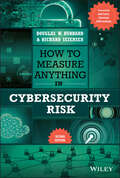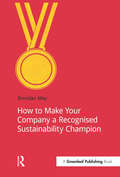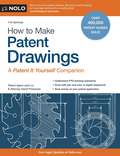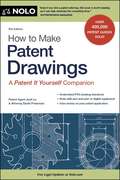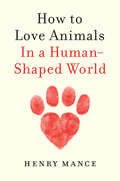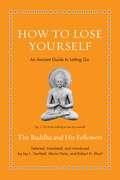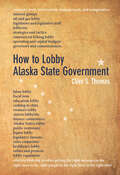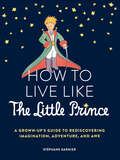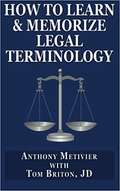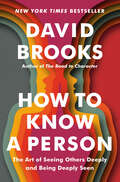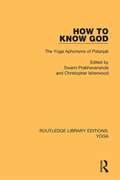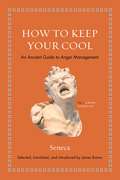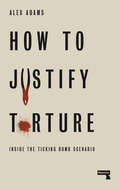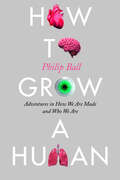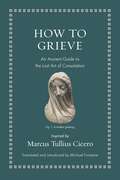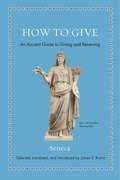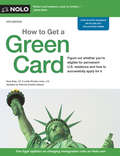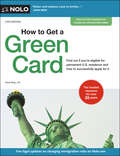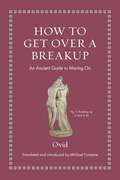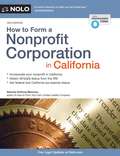- Table View
- List View
How to Measure Anything in Cybersecurity Risk
by Douglas W. Hubbard Richard SeiersenA start-to-finish guide for realistically measuring cybersecurity risk In the newly revised How to Measure Anything in Cybersecurity Risk, Second Edition, a pioneering information security professional and a leader in quantitative analysis methods delivers yet another eye-opening text applying the quantitative language of risk analysis to cybersecurity. In the book, the authors demonstrate how to quantify uncertainty and shed light on how to measure seemingly intangible goals. It's a practical guide to improving risk assessment with a straightforward and simple framework. Advanced methods and detailed advice for a variety of use cases round out the book, which also includes: A new "Rapid Risk Audit" for a first quick quantitative risk assessment. New research on the real impact of reputation damage New Bayesian examples for assessing risk with little data New material on simple measurement and estimation, pseudo-random number generators, and advice on combining expert opinion Dispelling long-held beliefs and myths about information security, How to Measure Anything in Cybersecurity Risk is an essential roadmap for IT security managers, CFOs, risk and compliance professionals, and even statisticians looking for novel new ways to apply quantitative techniques to cybersecurity.
How to Make Your Company a Recognized Sustainability Champion
by Brendan MayIs it really worth the time and resources to make your company a recognized sustainability champion? And how on earth should you go about it? In this concise and practical book, Brendan May demonstrates why the companies that will be fit for purpose in 2020 are addressing sustainability now, and then outlines a strategy for how to do that.May draws on 15 years' experience on the front line of sustainable business – as Chief Executive of a business–NGO partnership, as an environmental campaigner and as advisor to multinational corporations on sustainability strategy and communications – and outlines the emerging trends that will change the rules of the game forever.By the time you've finished this book you'll know who you need to know, what you need to know, and the dos and don'ts in the quest to make your business a true champion of sustainability.
How to Make Patent Drawings
by David Pressman Jack LoSave on patent drafting by doing it yourself! If you're trying to patent your invention, you know need a drawing to complete your USPTO application. Professional patent drafters charge per sheet for their patent drawing services and it can cost you hundreds of dollars. But with How to Make Patent Drawings you'll be able to complete this crucial step and create a patent drawing that complies with the strict rules of the USPTO. This book is a good companion for Patent It Yourself. The 7th edition is completely updated to reflect recent changes to patent law and the newest advances in technical drawing. It includes all necessary forms with step-by-step instructions.
How to Make Patent Drawings
by Jack LoPatent drafters charge $75 to $100 per sheet to prepare drawings -- but you can draw them yourself! How to Make Patent Drawings is an essential guide for inventors who want to complete a crucial step in the patenting process themselves -- creating formal patent drawings that comply with the strict rules of the U.S. Patent and Trademark Office (and save hundreds or even thousands of dollars). Written by two experts in the patent field, How to Make Patent Drawings,/i> shows you how to: make utility patent drawings make design patent drawings utilize pen and paper, or digital equipment respond to Patent Office Actions regarding drawings Plus, once you've secured a patent with your drawings, you can also use them to market and promote your product to prospective manufacturers and customers. The 6th edition is completely updated to reflect recent changes to patent law and the newest advances in technical drawing. It includes all necessary forms, plus step-by-step instructions for filling them out.
How to Make Boards Work
by Andrew KakabadseFrom a global overview of governance and why have boards in the first place to the critical leadership skills of the Chairman, this book offers a unique collection of original contributions that are intellectually riveting and distinctly useful for board directors. This is no mean feat, bearing in mind the scandals that have bedeviled corporations and governments. How to Make Boards Work captures latest governance thinking and research whilst simultaneously addressing the theory and practice of board directors relations. The role and contribution of boards is scrutinized within the broader framework of global, social and political complexity. Clearly arguing for the need to reinvent boards, the book's groundbreaking contribution offers latest thinking and global research on the skills, knowledge and qualities necessary for the high performing board and board director. The integration of monitoring through governance codes with the necessary leadership of the directors, capture the nature of the high performing global board. From why have boards, to what to do on boards, this unusual collection is the board directors' guide to sustainable value creation.
How to Love Animals: In a Human-Shaped World
by Henry ManceA personal journey into our evolving relationships with animals, and a thought-provoking look at how those bonds are being challenged and reformed across disciplinesWe love animals, but does that make the animals' lives any happier? With factory farms, climate change and deforestation, this might be the worst time in history to be an animal. If we took animals' experiences seriously, how could we eat, think and live differently?How to Love Animals is a lively and important portrait of our evolving relationship with animals, and how we can share our planet fairly. Mance works in an abattoir and on a pig farm to explore the reality of eating meat and dairy. He explores our dilemmas over hunting wild animals, over-fishing the seas, visiting zoos and saving wild spaces. What might happen if we extended the love we show to our pets to other sentient beings? In an age of extinction and pandemics, our relationship with animals has become unsustainable. Mance argues that there has never been a better time to become vegetarian or vegan, and that the conservation movement can flourish, if people in wealthy countries shrink our footprint.Mance seeks answers from chefs, farmers, activists, philosophers, politicians and tech visionaries who are redefining how we think about animals. Inspired by the author's young daughters, his book is a story of discovery and hope that outlines how we can find a balance with animals that fits with our basic love for them.
How to Lose Yourself: An Ancient Guide to Letting Go (Ancient Wisdom for Modern Readers)
by Jay L. Garfield, Maria Heim, and Robert H. SharfInviting new translations of classical Buddhist texts about why the self is an illusion—and why giving it up can free us from sufferingFrom self-realization and self-promotion to self-help and the selfie, the modern world encourages us to be self-obsessed. We are even told that finding ourselves is the key to happiness. Better to lose yourself! More than 2,500 years ago, the Buddha argued that the self is an illusion—and that our belief in it is the cause of most, if not all, of our suffering. How to Lose Yourself presents lively, accessible, and expert new translations of ancient Buddhist writings about the central, unique, and powerful Buddhist teaching of &“no-self.&”Drawn from three important Buddhist traditions, these essential Indian, Tibetan, and Chinese writings provide a rich sampling of the ways Buddhist philosophers have understood the idea that we are selfless persons—and why this insight is so therapeutic. When we let go of the self, we are awakened to the presence of all things as they truly are, and we let go of the anxiety, fear, greed, and hatred that are the source of all suffering.Complete with an introduction and headnotes to each selection, and the original texts on facing pages, How to Lose Yourself is a concise guide to a transformative idea.
How to Lobby Alaska State Government
by Clive S. ThomasLobbying is about getting the right message to the right people in the right form at the right time. Even the most persuasive arguments or most influential groups will come up short if they aren’t combined with personal connections and an understanding of human nature. How to Lobby Alaska State Government is a guide to the essentials of organizing and implementing a lobbying campaign in Alaska that recognizes how you lobby is as important as who you lobby. This book starts by helping new lobbyists to think politically, by explaining the structure and operation of state government, the psychology and needs of public officials, and where the power lies in Juneau—who’s got political clout. How to Lobby then moves into the nitty-gritty of a lobbying campaign. It covers the basics of group influence, campaign planning and management, the pros and cons of various group tactics, tips on face-to-face meetings, and the challenges of lobbying day-to-day. In addition to extensive guidance on what to do, this book also emphasizes the things to avoid that will undermine or eliminate a lobbyist’s chances of success. Pragmatic and portable, this book will be valuable to new and professional lobbyists both, and anyone looking for fresh perspectives on this important business.
How to Live Like the Little Prince: A Grown-Up's Guide to Rediscovering Imagination, Adventure, and Awe
by Stéphane Garnier"All grown-ups were once children... but only a few of them remember it."–Antoine St. Exupéry, The Little PrinceFull of insight, inspiration, and gentle compassion for our complicated modern lives, How to Live Like the Little Prince captures the brilliance and wisdom of Antoine St. Exupéry's beloved tale. Through the eyes of the iconic Little Prince, Stéphane Garnier reminds us who we were before we grew up and teaches us to once again take time to live, play, and find wonder in the small, everyday moments.Few books have been as universally cherished as Antione St. Exupéry's The Little Prince. First published in 1943 and now one of the bestselling books of all time, the haunting, lyrical fable explores the meaning of life through a young boy who travels the universe in search of happiness.In How to Live Like the Little Prince, Stéphane Garnier revisits St. Exupér's story with a fresh, contemporary eye, urging us—as the Little Prince did—to preserve our childlike wonder by slowing down, dreaming big, and showing humble kindness to our planet and one another. In each chapter, Garnier beautifully conjures the expressive wisdom of St. Exupéry's storytelling, reminding us of essential lessons like how to be rebellious and incorruptible, how to leave your mark on the world, how to be free from the judgment of others, and how to let go and be alone.Featuring the iconic original illustrations from The Little Prince alongside memorable quotations and thought-provoking ideas about how we can apply St. Exupéry's philosophies to the increasingly complex demands of modern life, Garnier offers a stirring guide to rediscovering what matters most—at any age.A great gift for fans of The Little Prince, graduation, retirement, and other life milestones.
How to Learn and Memorize Legal Terminology: Using a Memory Palace Specifically Designed for the Law & Its Precedents
by Anthony Metivier Tom Briton<p>If you'd like to improve your ability to learn and memorize legal terminology by as much as 100%, 200%, even 300% (or more) ... using simple memory techniques that you can learn in 15-20 minutes (or less), then this may be the most important book that you will ever read. <p>Believe it or not, it really doesn't matter if you think you have a good memory or not. The information in this book will teach you: <p> <li>Why memory is like a bicycle everyone can ride (with some minor personal adjustments). <li>The real reason why you should ever be squeamish about using memorization techniques so that you can recall legal terminology and precedents with ease. <li>Why and how some of the most famous memory skills are applicable to learning any subject, especially the law. <li>How you can easily create a 26 "letter location" memory system based around the alphabet to establish "legal fluency." <li>Unique techniques that will have you literally "tuning in" on the law and its terminology. <li>How to separate and organize legal terminology in the most effective manner for memorization. <li>Two secret ways you can use relaxation to aid the memorization process. These two methods alone are worth the price of this book because they will literally eliminate the stress and apprehension as you study, learn and memorize the law. <li>And much, much more ...</li> </p>
How to Know a Person: The Art of Seeing Others Deeply and Being Deeply Seen
by David BrooksNEW YORK TIMES BESTSELLER • A practical, heartfelt guide to the art of truly knowing another person and fostering deeper connections at home, at work, and throughout our lives—from the author of The Road to Character and The Second Mountain&“More than a guide to better conversations, it&’s a blueprint for a more connected and humane way of living. It&’s a must-read for anyone looking to deepen their relationships and broaden their perspectives.&”—Bill Gates, GatesNotes (Summer Reading Pick)As David Brooks observes, &“There is one skill that lies at the heart of any healthy person, family, school, community organization, or society: the ability to see someone else deeply and make them feel seen—to accurately know another person, to let them feel valued, heard, and understood.&”And yet all around are people who feel invisible, unseen, misunderstood. In How to Know a Person, Brooks sets out to help us do better, posing essential questions: If you want to know a person, what kind of attention should you cast on them? What kind of conversations should you have? What parts of a person&’s story should you pay attention to?Driven by his trademark sense of curiosity and determination to grow as a person, Brooks draws from the fields of psychology and neuroscience and the worlds of theater, philosophy, history, and education to present a welcoming, hopeful, integrated approach to human connection. How to Know a Person helps readers become more understanding and considerate toward others, and to find the joy that comes from being seen. Along the way it offers a possible remedy for a society that is riven by fragmentation, hostility, and misperception.The act of seeing another person, Brooks argues, is profoundly creative: How can we look somebody in the eye and see something large in them and, in turn, see something larger in ourselves? How to Know a Person is for anyone searching for connection, and yearning to be understood.
How to Know God: The Yoga Aphorisms of Patanjali (Routledge Library Editions: Yoga #2)
by Swami Prabhavananda Christopher IsherwoodThe aphorisms collected in this book, first published in 1953, were composed by Patanjali, a great Indian sage, over 1,500 years ago, and here translated into clear English prose. The accompanying commentary interprets the sayings for the modern world, and in doing so gives a full picture of what yoga is, what its aims are, and how it can be practised.
How to Keep Your Cool: An Ancient Guide to Anger Management (Ancient Wisdom For Modern Readers Ser.)
by Seneca James S. RommTimeless wisdom on controlling anger in personal life and politics from the Roman Stoic philosopher and statesman SenecaIn his essay “On Anger” (De Ira), the Roman Stoic thinker Seneca (c. 4 BC–65 AD) argues that anger is the most destructive passion: “No plague has cost the human race more dear.” This was proved by his own life, which he barely preserved under one wrathful emperor, Caligula, and lost under a second, Nero. This splendid new translation of essential selections from “On Anger,” presented with an enlightening introduction and the original Latin on facing pages, offers readers a timeless guide to avoiding and managing anger. It vividly illustrates why the emotion is so dangerous and why controlling it would bring vast benefits to individuals and society.Drawing on his great arsenal of rhetoric, including historical examples (especially from Caligula’s horrific reign), anecdotes, quips, and soaring flights of eloquence, Seneca builds his case against anger with mounting intensity. Like a fire-and-brimstone preacher, he paints a grim picture of the moral perils to which anger exposes us, tracing nearly all the world’s evils to this one toxic source. But he then uplifts us with a beatific vision of the alternate path, a path of forgiveness and compassion that resonates with Christian and Buddhist ethics.Seneca’s thoughts on anger have never been more relevant than today, when uncivil discourse has increasingly infected public debate. Whether seeking personal growth or political renewal, readers will find, in Seneca’s wisdom, a valuable antidote to the ills of an angry age.
How to Justify Torture: Inside the Ticking Bomb Scenario
by Alex AdamsFrom Batman Begins to Tom Clancy, How to Justify Torture shows how contemporary culture creates simplified narratives about good guy torturers and bad guy victims, how dangerous this is politically, and what we can do to challenge it.If there was a bomb hidden somewhere in a major city, and you had the person responsible in your custody, would you torture them to get the information needed to stop the bomb exploding, preventing a devastating terrorist attack and saving thousands of lives?This is the ticking bomb scenario -- a thought experiment designed to demonstrate that torture can be justified.In How to Justify Torture, cultural critic Alex Adams examines the ticking bomb scenario in-depth, looking at the ways it is presented in films, novels, and TV shows -- from Batman Begins and Dirty Harry to French military thrillers and home invasion narratives. By critiquing its argument step by step, this short, provocative book reminds us that, despite what the ticking bomb scenario will have us believe, torture can never be justified.
How to Have an Enemy: Righteous Anger and the Work of Peace
by Melissa Florer-BixlerDoes Jesus' call to love our enemies mean that we should remain silent in the face of injustice? Jesus called us to love our enemies. But to befriend an enemy, we first have to acknowledge their existence, understand who they are, and recognize the ways they are acting in opposition to God's good news. <p><p>In How to Have an Enemy: Righteous Anger and the Work of Peace, Melissa Florer-Bixler looks closely at what the Bible says about enemies—who they are, what they do, and how Jesus and his followers responded to them. The result is a theology that allows us to name our enemies as a form of truth-telling about ourselves, our communities, and the histories in which our lives are embedded. Only then can we grapple with the power of the acts of destruction carried out by our enemies, and invite them to lay down their enmity, opening a path for healing, reconciliation, and unity. <p><p> Jesus named and confronted his enemies as an essential part to loving them. In this provocative book, Florer-Bixler calls us to do the same.
How to Grow a Human: Adventures in How We Are Made and Who We Are
by Philip BallThe award-winning science writer shares “a winding romp through advances in cell biology [that] pushes readers to ponder the boundaries of life” (Science).In the summer of 2017, scientists removed a tiny piece of flesh from Philip Ball’s arm and turned it into a rudimentary “mini-brain.” The skin cells, removed from his body, did not die but were instead transformed into nerve cells that independently arranged themselves into a dense network and communicated with each other, exchanging the raw signals of thought. This was life—but whose? That disconcerting question is the focus of Philip Ball’s How to Grow a Human.In this mind-bending tour of cutting-edge cell biology, Ball shows how recent innovations could lead to tailor-made replacement organs; new medical advances for repairing damage and assisting conception; and new ways of “growing a human.” Such methods would also create new options for gene editing, with all the attendant moral dilemmas. Ball argues that these advances can never be “just about the science,” because they are already laden with a host of social narratives, preconceptions, and prejudices. But beyond even that, these developments raise provocative questions about identity and self, birth and death, and force us to ask how mutable the human body really is—and what forms it might take in years to come.
How to Grieve: An Ancient Guide to the Lost Art of Consolation (Ancient Wisdom for Modern Readers)
by Marcus Tullius CiceroAn engaging new translation of a timeless masterpiece about coping with the death of a loved oneIn 45 BCE, the Roman statesman Cicero fell to pieces when his beloved daughter, Tullia, died from complications of childbirth. But from the depths of despair, Cicero fought his way back. In an effort to cope with his loss, he wrote a consolation speech—not for others, as had always been done, but for himself. And it worked. Cicero’s Consolation was something new in literature, equal parts philosophy and motivational speech. Drawing on the full range of Greek philosophy and Roman history, Cicero convinced himself that death and loss are part of life, and that if others have survived them, we can, too; resilience, endurance, and fortitude are the way forward.Lost in antiquity, Cicero’s Consolation was recreated in the Renaissance from hints in Cicero’s other writings and the Greek and Latin consolatory tradition. The resulting masterpiece—translated here for the first time in 250 years—is infused throughout with Cicero’s thought and spirit.Complete with the original Latin on facing pages and an inviting introduction, Michael Fontaine’s engaging translation makes this searching exploration of grief available to readers once again.
How to Give: An Ancient Guide to Giving and Receiving (Ancient Wisdom for Modern Readers)
by SenecaTimeless wisdom on generosity and gratitude from the great Stoic philosopher SenecaTo give and receive well may be the most human thing you can do—but it is also the closest you can come to divinity. So argues the great Roman Stoic thinker Seneca (c. 4 BCE–65 CE) in his longest and most searching moral treatise, “On Benefits” (De Beneficiis). James Romm’s splendid new translation of essential selections from this work conveys the heart of Seneca’s argument that generosity and gratitude are among the most important of all virtues.For Seneca, the impulse to give to others lies at the very foundation of society; without it, we are helpless creatures, worse than wild beasts. But generosity did not arise randomly or by chance. Seneca sees it as part of our desire to emulate the gods, whose creation of the earth and heavens stands as the greatest gift of all. Seneca’s soaring prose captures his wonder at that gift, and expresses a profound sense of gratitude that will inspire today’s readers.Complete with an enlightening introduction and the original Latin on facing pages, How to Give is a timeless guide to the profound significance of true generosity.
How to Get a Green Card: Legal Ways To Stay In The U. S. A.
by Ilona Bray Loida Nicolas LewisImmigration is often in the news, but few people understand who is actually able to apply for a U.S. green card. Many who do apply are denied. This book offers a helpful, step-by-step guide to discovering whether you match one of the green card categories available for people with no U.S. job offers, such as through family relationships, asylum, the visa lottery, and more. The book takes readers through the entire application process, with the help of handy checklists of required forms and documents, tips for avoiding mistakes and dealing with legal complications and bureaucratic holdups, and sample forms. This edition is completely revised to reflect the latest laws, contact information, and fees, plus critical new procedural information based on recent actions by the Trump Administration. This book is not appropriate for people seeking temporary visas to the U.S. (such as tourist or student visas) or work-related green cards.
How to Get a Green Card: Legal Ways To Stay In The U. S. A.
by Ilona BrayThe ultimate green card guide The U.S. immigration system is an enormous bureaucracy, so it’s vital that you understand it before attempting to apply for a green card. Making a mistake can lead to delays and hassles or even ruin your chances for success. How to Get a Green Card provides everything you need to know about qualifying for permanent U.S. residence if you don’t have an employer sponsoring you. Find out how to work with U.S. officials and prepare and present the right documents at the right time to get a green card through: parents, siblings, or adult children a U.S. spouse or fiancé green card lotteries (diversity visa) political asylum or refugee status a U visa for crime victims, or another category you might qualify for. The 14th edition covers new travel restrictions, public charge rules requiring more proof of income and health insurance coverage, changes to asylum eligibility, the wind-down of the Deferred Action for Childhood Arrivals (DACA) program, and other new restrictions and procedural changes. It also includes samples of all the key application forms.
How to Get a Green Card (7th edition)
by Ilona M. Bray Carl FalstromThis guide explains the basic requirements for obtaining legal permission to stay in the United States, and walks through the process for requesting a green card based on family relations, political asylum, the visa lottery, and ten years residency. The seventh edition features new authors who update legal and procedural changes. Annotation ©2007 Book News, Inc., Portland, OR (booknews.com)
How to Get a Green Card
by Ilona Bray Loida Nicolas LewisU.S. immigration law is a tangle of details. This book explains the most likely bases upon which an everyday person might qualify for a green card: family, marriage, asylum, the visa lottery, and a few lesser-known categories.Then, the book leads readers safely through the enormous immigration bureaucracy, with step-by-step application instructions, checklists with required forms and documents, tips for avoiding mistakes and dealing with legal complications, and sample forms.This edition is completely revised to reflect the latest laws, including new rights to a green card for same-sex married couples, agency contact information, and fees, plus critical new procedural information, particularly concerning the new provisional waiver for unlawful presence. And if the immigration reform bill currently before congress becomes law, the book will cover its groundbreaking changes, including a new path to citizenship for immigrants currently in the country without documentation.This book is not appropriate for people seeking temporary visas or work-related green cards.
How to Get Over a Breakup: An Ancient Guide to Moving On (Ancient Wisdom for Modern Readers)
by OvidA modern translation of the ancient Roman poet Ovid&’s Remedies for Love—a witty and irreverent work about how to fall out of loveBreakups are the worst. On one scale devised by psychiatrists, only a spouse&’s death was ranked as more stressful than a marital split. Is there any treatment for a breakup? The ancient Roman poet Ovid thought so. Having become famous for teaching the art of seduction in The Art of Love, he then wrote Remedies for Love (Remedia Amoris), which presents thirty-eight frank and witty strategies for coping with unrequited love, falling out of love, ending a relationship, and healing a broken heart. How to Get Over a Breakup presents an unabashedly modern prose translation of Ovid&’s lighthearted and provocative work, complete with a lively introduction and the original Latin on facing pages.Ovid&’s advice—which he illustrates with ingenious interpretations of classical mythology—ranges from the practical, psychologically astute, and profound to the ironic, deliberately offensive, and bizarre. Some advice is conventional—such as staying busy, not spending time alone, and avoiding places associated with an ex. Some is off-color, such as having sex until you&’re sick of it. And some is simply and delightfully weird—such as becoming a lawyer and not eating arugula.Whether his advice is good or bad, entertaining or outrageous, How to Get Over a Breakup reveals an Ovid who sounds startlingly modern.
How to Form a Nonprofit Corporation in California
by Anthony MancusoStart a nonprofit corporation with the forms and information you need to give back to your community! Thousands of arts groups, educators, social service agencies and others have used How to Form a Nonprofit Corporation in California to get their organizations off the ground. With a nonprofit corporation, you'll gain recognition, save money, become eligible for grants, and protect your members and directors from liability. And you can do all of this without spending thousands on an attorney. With this easy to use guide, anyone can do it! How to Form a Nonprofit Corporation in California includes complete instructions for obtaining federal 501(c)(3) tax exemption and for qualifying public charity status forming a California nonprofit corporation, with the IRS. It also provides: . line by line instructions for completing your application . instructions and completed sample clauses for preparing articles of incorporation . ready to use bylaws for membership and non membership nonprofits . ready to use minutes for the organizational meeting . sheets with California's specific legal and tax requirements This edition is completely updated to cover changes to the law. You'll also get updated instructions for using Form 1023 and coverage of new online services and options related to forming your nonprofit corporation. Forms are available to download at nolo.com.
